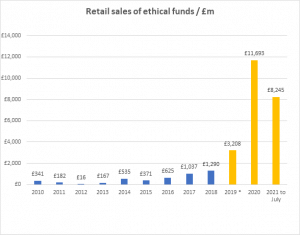Does this show there is an ‘ESG premium’?
The conclusion is that ethical investors have not had to sacrifice returns to satisfy their ESG principles in the last five years, and their funds have overall performed better than non-ethical peers. However, stylistic biases over and above their ESG focus have almost certainly helped to give them a boost over this period. This, and the fact that five years is a relatively small period over which to judge performance, suggests these numbers are not as yet evidence of any ‘ESG premium’ in fund performance.
The idea of an ESG premium is intuitively appealing. As more money is directed towards higher scoring ESG companies, that could drive the share prices of ethical companies higher, and lead to the establishment of an ESG premium in the performance of ethical funds. However, proving such a premium would also require a much longer time frame, and a wider data set than is available at the moment, and any analysis would at least need to adjust for differences between ethical and non-ethical funds in terms of regional allocation, sector exposure, charges, and the size of companies held within fund portfolios. Otherwise, other factors are likely to dominate the performance figures. For example, in the table above, over the last five years the decision whether to invest in the US or the UK has made a much bigger difference to returns than whether to invest ethically or not.
What about charges?
In terms of charges, ethical investors seem to be largely paying the same as their non-ethical counterparts. The exception is the UK All Companies sector, where annual charges are significantly lower among ESG funds. That could be a result of this being one of the oldest sectors and carrying a higher number of legacy funds with less competitive charges from a bygone era. Meanwhile, ethical funds which have been launched in the sector more recently have probably come to market with keener prices to pull new investors in.
Ethical fund sales
The oldest ethical unit trust funds in the Investment Association sectors actually date back to the 1980s. It’s just that no-one’s really taken much notice of them until recently. The last three years have seen a step change in the amount of money flowing into responsible investment strategies. A lot of that is clearly driven by the climate change agenda, and heightened awareness of the negative environmental impact stemming from certain industries.















